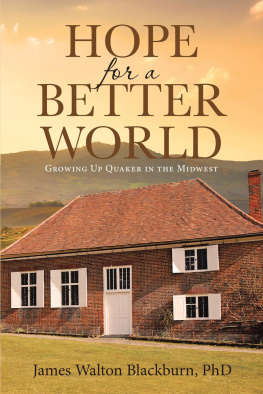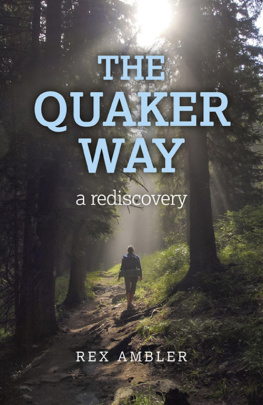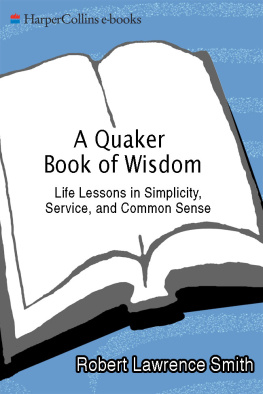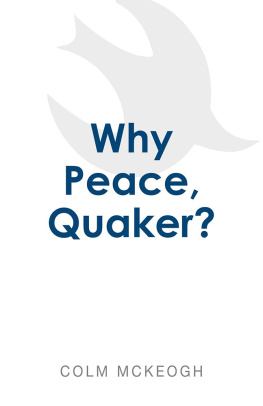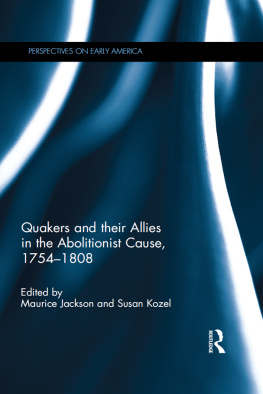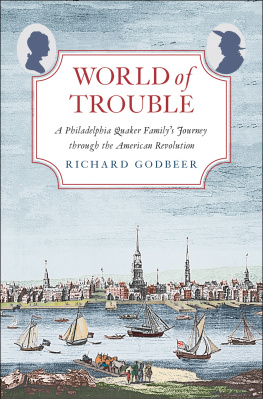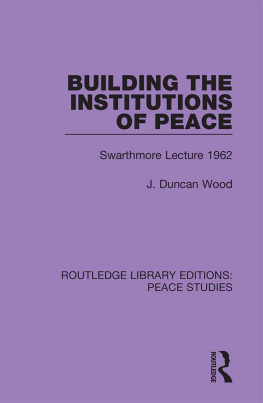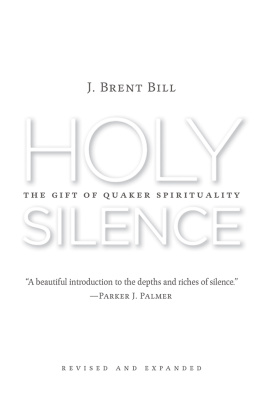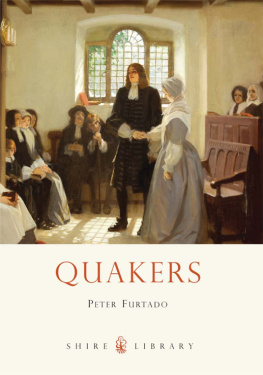Section 1
The Quakers
The Quakers, or the Religious Society of Friends, originated in England in the seventeenth century. Two characteristics of Quakers are their stand against war, as taught by Jesus in the New Testament, and their belief in that of God in every person. They believe each human being has personal access to God through the Inner Light, which enlightens every person.
The early Quakers had an apostolic fervor that God was pushing them out to be bearers of a new and mighty word of Life which was to remake the world, a campaign of spiritual conquest (Jones 2004, xiii). William Penn, founder of Pennsylvania, said Quakerism was primitive Christianity revived. They felt their message would change the world just as the message of the Apostles changed the world. They lived under the sense of end time, as did the early New Testament Christians, which accounted for their sense of urgency about their mission (Cooper 2000, 168).
Snapshot
In A Q uaker Book of Wisdom , Robert Lawrence Smith, former headmaster of Sidwell Friends School, gives an amusing snapshot of Quakers.
Quakerism is the only faith that is most commonly explained in a cascade of negatives. Quakerism has no theology, no body of religious dogma, no sacred books, no written creed. Traditional Quaker worship does not involve a minister, priest or other religious leader. There is no liturgy. There are no crucifixes or other religious images in Quaker Meetinghouses or homes. (Smith 1998, 18)
In a world of chaos and international conflict, the Quakers have a faith that offers great hope to a torn and troubled world. They believe that each person has access to God through the Inner Light, which enlightens every person in the world. They look to John 1:9, He was the true light that enlightens everyone coming into the world. (The Holy Bible, New Revised Standard Version 1989). Quakers take seriously the admonition of Jesus to love your enemies and His statement Blessed are the peacemakers. They feel that the way of the cross of Jesus is entirely inconsistent with war or preparation for war.
Broader Picture
Whalen presents a broader picture. A personal commitment to God and humanity distinguishes Quakers.
The Quaker worships God by serving Him and through society. Although decidedly mystical, Quakerism does not understand a purely interior religion. It believes that the Christian faith must express itself in action and service. The Quaker tries to seek direct divine illumination by jettisoning all the Christian sacraments, rituals, hymns, formal prayers, and priesthood. The Quaker tries to live by the Inner Light. The Inner Light is not conscience but it is that which enlightens conscience. Quaker theologians usually describe the Inner Light as that of God in each man. People discern the Inner Light when they silently and patiently wait for God to speak to them. Such direct illumination is far superior to the written revelation of the Bible or Tradition of the church, in the Quaker view. (Whalen 1991, 6)
George Fox and the Quaker Movement
The Religions Society of Friends, or Quakers, originated in the seventeenth century in the midst of the English Civil War when there was great religious, economic and political turmoil. (Cooper 2000, 2)
The Quakers in Iowa, who founded Scattergood Friends School, were Wilburites. They still maintain the silent meditation of the traditional Quaker Meeting for Worship in which everyone waits for an inspirational message from God, or the Holy Spirit. This style was practiced in the Quaker Colony of Pennsylvania founded by William Penn.
George Fox (16241691) is often described as the founder of the Friends (Whalen 1991, 6). Although some suggest that Foxs personality defined the Quaker movement, Barbour states that many early Friends went through similar religious experiences and brought as strong a message as Fox (Barbour 1988, 25).
More accurately, Fox was the preeminent figure in the early Quaker movement (Oliver 2007, xii). Like many in a chaotic decade of war, famine, and depression, Fox wandered restlessly before he was twenty. He argued theology everywhere, and in 16461647, a series of religious openings came to him as insights that convinced him of the truth of ideas already common among separatists and Baptists (Barbour 1988, 26). For four years, Fox had sought a new way to gain direct access to God.
When all my hopes in men were gone, so that I had nothing outwardly to help me, nor could I tell what to do, then, O then, I heard a voice which said, There is One, even Christ Jesus, that can speak to thy condition. And when I heard it, my heart did leap for joy. He developed the idea of the Inner Light within each person (Whalen 1991, 15). He also saw within himself that there is an ocean of darkness and death, but an infinite ocean of light and love, which flowed over the ocean of darkness (Barbour 1988, 2627).
In 1647, he began preaching his new religious ideas and won converts in northern England. Five years later, he organized the Society of Friends (Whalen 1991, 15). Pendle Hill is a site in England that has special meaning to Quakers. In 1642, George Fox felt an inward call to climb Pendle Hill to, as in Isaiah 40:9, Sound forth the day of the Lord... The Lord let me see in what places he had a great people to be gathered (Barbour 1988, 27).
George Fox articulated a desire to remove the causes of war. He refused to join Cromwells army and stated that he lived in the virtue of that life and power that took away the occasion of all wars (Barbour, 27). He spent many years in prison for his beliefs as did many Quakers. They sometimes gained adherents when other prisoners admired their deep commitment to their faith.
Fox and his followers believed that their convictions arose from an experience of the Light of Christ Within. It was a call to live up to the measure of Light given to each person. It resulted in practical righteousness of each person living out ones faith. Early Quakers believed they were bringing alive the witness of first-century Christians. William Penn, the founder of Pennsylvania, said that Quakerism was primitive Christianity revived.
The Inner Light
George Fox taught that each person is enlightened by God through the Holy Spirit, described as the Inner Light. Although the Bible was very important to the early Quakers, they felt that the same Spirit, which inspired the Scriptures, could be directly experienced by every person. The Spark of the Divine was that of God in every person. Their Meeting for Worship was based in silent meditation in which each worshiper could be inspired with a message by the Holy Spirit which could be shared.
The Quaker tries to live by the Inner Light. The Inner Light is not conscience but it is that which enlightens conscience. Quaker theologians usually describe the Inner Light as that of God in each man. People discern the Inner Light when they silently and patiently wait for God to speak to them. Such direct illumination is far superior to the written revelation of the Bible or Tradition of the church, in the Quaker view (Whalen 1991, 6).
The Term Quaker
Whalen tells how the term Quaker came to describe the Society of Friends. George Fox was brought before a magistrate to answer for his radical and unorthodox views. Fox warned the judge that even he must tremble and quake at the Word of the Lord. The judge asked Fox if he were a Quaker. The name Quaker stuck and is now accepted by Friends, even though meant to be derogatory (Whalen 1991, 3).
The Early Quakers Rejected the Sacraments, Tithes, John Blackburns Horse
Early Quakers rejected the sacraments and tithing in payment of priests. My earliest known Blackburn ancestor, John Blackburn of Armagh, Ireland, had a horse taken by the local priest in payment of his tithe, even though the practice had been outlawed by the distant Parliament in London.

